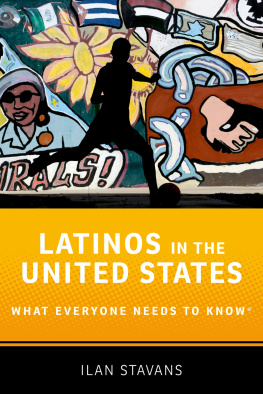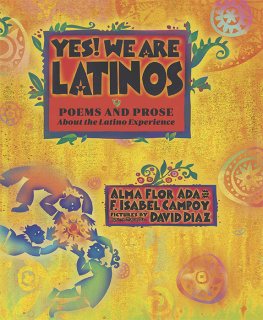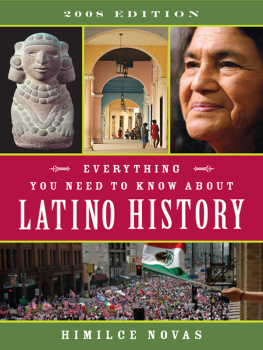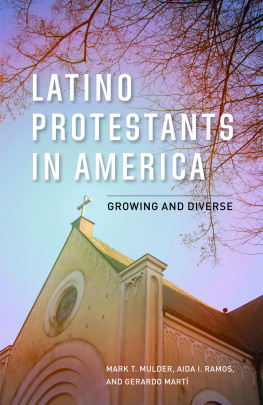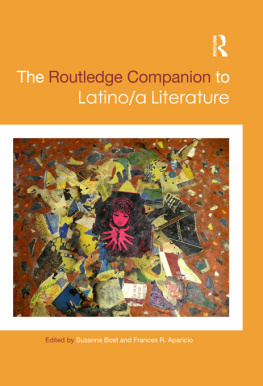Idelisse Malav is an organizational consultant who ran the Tides Foundation in California for eleven years and was vice president of the Ms. Foundation. She co-authored, with Elizabeth Debold and Marie Wilson, Mother Daughter Revolution. Born in Puerto Rico, she grew up and lives in New York City. Esti Giordani, a New Yorkborn Puerto Rican, is a writer living in Los Angeles. She currently works in television.
Until recently, she was a communications strategist and blogger for the Social Transformation Project. Also by Idelisse MalavMother Daughter Revolution(with Elizabeth Debold and Marie Wilson) 2015 by Idelisse Malav and Esti GiordaniAll rights reserved.No part of this book may be reproduced, in any form, without written permission from the publisher.Requests for permission to reproduce selections from this book should be mailed to: Permissions Department, The New Press, 120 Wall Street, 31st floor, New York, NY 10005.Published in the United States by The New Press, New York, 2015Distributed by Perseus Distribution978-1-62097-019-5 (e-book)CIP data is availableThe New Press publishes books that promote and enrich public discussion and understanding of the issues vital to our democracy and to a more equitable world. These books are made possible by the enthusiasm of our readers; the support of a committed group of donors, large and small; the collaboration of our many partners in the independent media and the not-for-profit sector; booksellers, who often hand-sell New Press books; librarians; and above all by our authors.www.thenewpress.comBook design and composition by Bookbright MediaThis book was set in Avenir LT and Jockey10 9 8 7 6 5 4 3 2 1This book is dedicated to Alberto Tata Malav and Emma Nani Carattini. Like so many others, you traveled far and crossed borders to get here. Thank you for all you did to help us flourish.CONTENTSThanks first to researcher par excellence, Erin Meggyessy, for all your help along the way. You were an indispensable addition to this project.
2015 by Idelisse Malav and Esti GiordaniAll rights reserved.No part of this book may be reproduced, in any form, without written permission from the publisher.Requests for permission to reproduce selections from this book should be mailed to: Permissions Department, The New Press, 120 Wall Street, 31st floor, New York, NY 10005.Published in the United States by The New Press, New York, 2015Distributed by Perseus Distribution978-1-62097-019-5 (e-book)CIP data is availableThe New Press publishes books that promote and enrich public discussion and understanding of the issues vital to our democracy and to a more equitable world. These books are made possible by the enthusiasm of our readers; the support of a committed group of donors, large and small; the collaboration of our many partners in the independent media and the not-for-profit sector; booksellers, who often hand-sell New Press books; librarians; and above all by our authors.www.thenewpress.comBook design and composition by Bookbright MediaThis book was set in Avenir LT and Jockey10 9 8 7 6 5 4 3 2 1This book is dedicated to Alberto Tata Malav and Emma Nani Carattini. Like so many others, you traveled far and crossed borders to get here. Thank you for all you did to help us flourish.CONTENTSThanks first to researcher par excellence, Erin Meggyessy, for all your help along the way. You were an indispensable addition to this project.
Many thanks to Amanda Verwey, Gabriel Giordani, Jodie Tonita, Sandra Garca Betancourt, the women of That Creative Thing, Essence Harden, Lauren Shell, Paul Sheffield, Owen Morse, Gabriel Kenny, Sophie Hinrichsen, Ramona Gonzalez, Ali Liebegott, and Emma Carattini for your loving support throughout the writing of this book.Even well-educated, amiable, open-minded people in the United States do not realize that their country has a Hispanic past, as well as a Hispanic future.Felipe Fernandea-ArmestoOur America: A Hispanic History of the United StatesT he growing Latino presence in the United States matters, and most of us, non-Latino and Latino alike, are just beginning to pay attention to what it means for all of us. The sheer number of Latinos living in the United States today is more likely to have grabbed our attention than Latinos crucial role in Americas unfolding future. The numbers are staggering. Right now, with 53 million Latinos in the United States, one in six Americans is Latino. In three short decades, it will be closer to one in three.Latinos are not a homogenous group. American Latinosalso frequently referred to as Hispanicsare a pan-ethnic group with roots in nineteen Spanish-speaking Latin American countries and Spain.
The majority of Latinos living in the United States today were born here, but a third are immigrants, and many more are the children and grandchildren of immigrants. Most speak English well, but also speak Spanish. Some dont speak English, and others dont speak Spanish. Racially diverse, many Latinos acknowledge a mixed-race heritage that often varies by country of origin. Latinos are a much younger population than Whites or African Americans, but some national origin groups in the mix are years older or younger than the average for all Latinos. As a group, they are characterized by economic, political, social, and cultural differences, as well as similarities.
Some Latinos have roots in this country that reach further back than any other racial or ethnic group in the country except for Native Americans. Ignored by history books and the media, Latino history in the United States extends far beyond the current immigration debate.Before the English established their first settlement in the New World, Spanish conquistadores probed forty-eight of the fifty states. With more than five hundred years of history in North America, Spaniards and Mexicans were already in lands annexed by the United States in the nineteenth century through wars and treaties fueled by American Manifest Destiny that increased the size of the United States by one-third, including all or parts of ten states. Puerto Rico, still a territory of the United States today, was acquired at the end of the Spanish American War of 1898.While Spaniards and Mexicans have an especially long history in the United States, waves of immigration from across Latin America from the 1930s to the 1980s doubled Latino representation in the United States in a fifty-year period. Today, Mexicans are still the largest Latino group in our country and our largest immigrant group.Although the United States is routinely and proudly referred to as a country of immigrants, waves of immigration still inspire economic and cultural fears. citizens, without due process. citizens, without due process.
Often randomly picked up off the streets and loaded onto buses, Mexican Americans were taken to Mexico and stranded there. In 2006 the State of California adopted The Apology Act, acknowledging its role in what is euphemistically known as the Mexican Repatriation. The federal government has yet to apologize.The economic fears that shaped these events are still present today but changing. The focus of the immigrant debate has shifted to undocumented immigrants, most of whom are Mexicans and other Latinos. In the past, undocumented immigration was less of an issue simply because the United States placed fewer restrictions on immigration than it does now. The ongoing economic crisis intensified fears that undocumented immigrants are stealing jobs. Yet the majority of Americans in this country are not giving into those fears.
Instead, seven-in-ten Republicans and eight-in-ten Democrats believe that [m]ost undocumented immigrants are hard workers who should have the opportunity to stay in this country and improve their lives. Perhaps the average American is coming to understand that American economic woes cannot be blamed on immigrants, that instead, as most economists agree, immigrant workers grow the economy as well as the demand for goods and services that creates jobs.The cultural fears that usually accompany these economic fears center on assimilation or acculturation. Often-quoted Harvard historian Samuel Huntington named Latin American immigrants, especially Mexicans, as the single most immediate and most serious challenge to Americas traditional identity.
Next page

